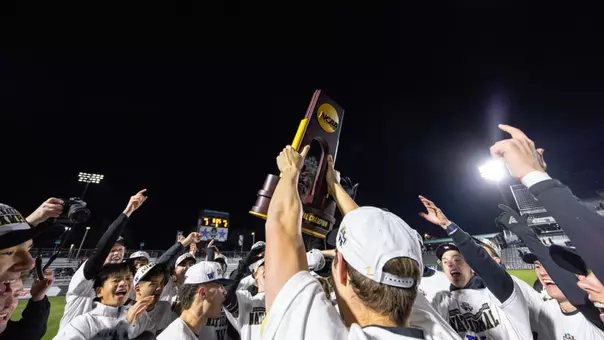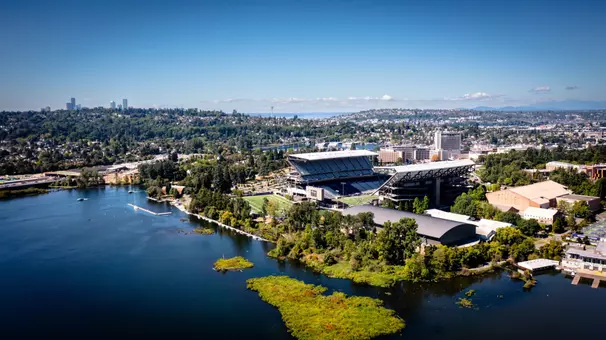
The Details: Bwana Is ‘Grateful’ For Everything He Has
October 12, 2016 | General, Men's Soccer
Handwalla Bwana apologized for being late. The freshman had just finished class and had to cross campus before making his way down to Dempsey Indoor for a photoshoot.
Wearing a black hoodie over a plaid shirt with dark jeans purposely scuffed at the knees, he looked like any other college student.
He smiled. That expression comes easy these days, because for the midfielder, after surviving hell, life at Washington is a dream come true.
"I'm grateful for what I have," he said. "Being here is – I don't know how to describe it – I have everything."
Born in Mombasa, Kenya, Bwana doesn't remember much from his time in the country's second-largest city. His father, Mohamed, left when he was 2 and by the time he turned 5 he was living at an Islamic boarding school learning Arabic with 20 to 30 other children, "in the middle of nowhere."
While living at the boarding school, Bwana only saw his mother, Fatima Yassin, once a year.
"It was tough there, but at the same time, it helped me grow without my mom, without my family," Bwana said. "I grew up fast. Instead of being a baby, it was like I was a teenager. My mom wasn't there. It was my responsibility. I had to take care of myself."
After a few years at the boarding school, his mother made a decision. She decided her family's future was in America. But to get there, Yassin, Bwana and his younger brother, Musab, had to first spend the better part of a decade living in the Kakuma refugee camp.
"She didn't want us to stay there for a long time, because of what was going on in Kenya," Bwana said.
In the hot, expansive, open space in northwestern Kenya, Bwana said newcomers to Kakuma build mud huts wherever they can find room.
"There's sand, nothing else," he said. "Just open space."
With the help of family members, Yassin and her two sons built their home and then spent years "surviving" as they waited for their American dream.








There was the six-mile (roundtrip) walk in 90-degree heat for water and nights filled with terror as the family worried about who might walk through the door. They had the rough equivalent of a fence to keep people out, but there were daily dangers in the camp.
"Every day you heard shooting," he said. "Every day you heard that someone had been robbed. Every day you heard someone had been raped. It was tough. It was scary, especially for women."
On one of the scariest days for Bwana, he was at the mosque. He was praying. All of a sudden there were gunshots. A family member was wounded. Bwana was 10 feet away.
"It was hard to live over there, really hard," he said.
The United Nations provided flour and oil to those living in the refugee camp, so Yassin tried to be creative with her cooking. The family ate a lot of uji – a type of porridge designed to provide energy in the morning – and chapati – an unleavened, pan-cooked bread.
"We got used to the same food every day, but I guess food is food," he said. "You should be grateful for it."
On Fridays, food would be brought in from the city, making the meals a bit more memorable.
"As a Muslim, Friday is a special day, so my mom would make something really nice," he said.
For Bwana, the days were long and hot, dusty and dangerous, but he always had soccer.
"When I was younger, he (his father, who now lives in Bellingham) kind of forced me to love the game, but at the same time, as I grew up, I picked up the game," he said.
Growing up, it was truly a game. It was a way to find fun in an otherwise bleak situation. After getting water in the morning and going to school, the children in Kauma spent the rest of the day playing soccer.
With four players to a team, they weren't focused on fundamentals. They were simply looking for an escape.
"It steadied our minds," he said. "We didn't have to think about family or struggling. It was just, 'OK, we're going to play and have fun with it.'"
As difficult as life was in the camp, Yassin had a plan. She was determined to provide a better life for her children.
"She wanted her kids to get the best education they could and the best education was in America, because there were more opportunities," he said. "If you're poor, you have the opportunity to get a scholarship. This is where she wanted us to be."
It took about seven years for Bwana's family to make it to America. Their journey west started in Atlanta, Ga.
"We got really lucky to be able to come here to America," he said.
The transition wasn't easy.
"We had no idea what was going on," he said. "We just didn't know the life in America."
The family moved to Seattle after three months. Yassin had a cousin in the city, so it seemed like a good fit.
Bwana said that first year was the "worst of his life."
He spoke four languages – Somali, Swahili, Bajuni and Arabic – when he arrived in America, but since he didn't speak English, he struggled to interact with his classmates.
"I didn't have any friends," he said. "I was stressing. I had no idea what to do."
Bwana wanted to help his mother. He didn't know how.
Soccer saved him.
He learned the language by playing a game he understood. He picked up English quickly, while learning how to play on a team. From Ballard High School to the Sounders FC Academy, Bwana grew his game.
His mother got a job at Goodwill to support her children. They put the nightmare of the refugee camp behind them. They cherished little things most people take for granted, like being able to get a complete night's sleep in a comfortable bed, to eat a pizza – Bwana's favorite – or a sandwich from Subway – his brother's meal of choice.
For Bwana, his journey has provided perspective. He went from having to walk miles for water that wasn't always clean to living in a country where a fresh, cold drink is rarely more than a few feet away.
"A lot of people complain, complain about homework, complain about this or that," he said. "They don't know there are kids out there who would kill each other for this opportunity."
So, whether it's an assignment for a class, a grueling practice or an afternoon photoshoot, Bwana is quick with a smile. After all, he is the first member of his family to travel this path.
"You're going to do things that nobody in our family had done," Bwana's mother told him. "Take advantage of it. If you get the opportunity to go to college and play ball, take it. Just don't fail. The worst thing you could do is fail. Take the opportunity. Make the most of it. If it requires you to not get sleep at night, do it, because at the end of the day it's going to pay off."
Early in his college career, Bwana is finding success both on the field and in the classroom. In fact, he is currently the team's leader in goals (four).
After making it this far, he sees no reason to slow down.
"We come from a poor village and we're living the life now," said Bwana, who makes sure to call Yassin every day to check in, even though they only live about 12 miles apart. "I'm grateful for what I have. I don't complain. I never, ever complain."
About five years after moving to Seattle, Bwana is getting a free education while playing soccer in the Pac-12. This is the life Yassin wanted for her son. This opportunity validates their struggle.
"It was just a tough life, but it paid off in the end," he said.
Then he smiled, again, because for Bwana, this is a dream. He went through hell, but he survived. Now every opportunity is something to seize.












